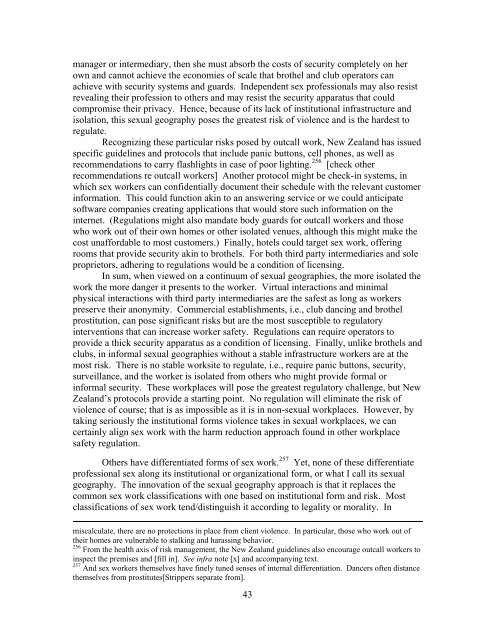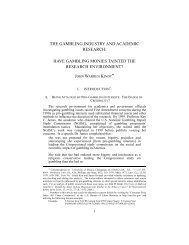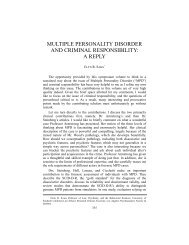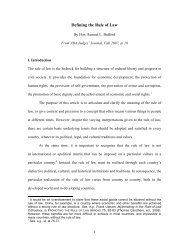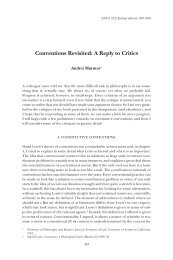1 Regulating Sex Work Adrienne D. Davis VERY ROUGH DRAFT ...
1 Regulating Sex Work Adrienne D. Davis VERY ROUGH DRAFT ...
1 Regulating Sex Work Adrienne D. Davis VERY ROUGH DRAFT ...
Create successful ePaper yourself
Turn your PDF publications into a flip-book with our unique Google optimized e-Paper software.
manager or intermediary, then she must absorb the costs of security completely on her<br />
own and cannot achieve the economies of scale that brothel and club operators can<br />
achieve with security systems and guards. Independent sex professionals may also resist<br />
revealing their profession to others and may resist the security apparatus that could<br />
compromise their privacy. Hence, because of its lack of institutional infrastructure and<br />
isolation, this sexual geography poses the greatest risk of violence and is the hardest to<br />
regulate.<br />
Recognizing these particular risks posed by outcall work, New Zealand has issued<br />
specific guidelines and protocols that include panic buttons, cell phones, as well as<br />
recommendations to carry flashlights in case of poor lighting. 256 [check other<br />
recommendations re outcall workers] Another protocol might be check-in systems, in<br />
which sex workers can confidentially document their schedule with the relevant customer<br />
information. This could function akin to an answering service or we could anticipate<br />
software companies creating applications that would store such information on the<br />
internet. (Regulations might also mandate body guards for outcall workers and those<br />
who work out of their own homes or other isolated venues, although this might make the<br />
cost unaffordable to most customers.) Finally, hotels could target sex work, offering<br />
rooms that provide security akin to brothels. For both third party intermediaries and sole<br />
proprietors, adhering to regulations would be a condition of licensing.<br />
In sum, when viewed on a continuum of sexual geographies, the more isolated the<br />
work the more danger it presents to the worker. Virtual interactions and minimal<br />
physical interactions with third party intermediaries are the safest as long as workers<br />
preserve their anonymity. Commercial establishments, i.e., club dancing and brothel<br />
prostitution, can pose significant risks but are the most susceptible to regulatory<br />
interventions that can increase worker safety. Regulations can require operators to<br />
provide a thick security apparatus as a condition of licensing. Finally, unlike brothels and<br />
clubs, in informal sexual geographies without a stable infrastructure workers are at the<br />
most risk. There is no stable worksite to regulate, i.e., require panic buttons, security,<br />
surveillance, and the worker is isolated from others who might provide formal or<br />
informal security. These workplaces will pose the greatest regulatory challenge, but New<br />
Zealand’s protocols provide a starting point. No regulation will eliminate the risk of<br />
violence of course; that is as impossible as it is in non-sexual workplaces. However, by<br />
taking seriously the institutional forms violence takes in sexual workplaces, we can<br />
certainly align sex work with the harm reduction approach found in other workplace<br />
safety regulation.<br />
Others have differentiated forms of sex work. 257 Yet, none of these differentiate<br />
professional sex along its institutional or organizational form, or what I call its sexual<br />
geography. The innovation of the sexual geography approach is that it replaces the<br />
common sex work classifications with one based on institutional form and risk. Most<br />
classifications of sex work tend/distinguish it according to legality or morality. In<br />
miscalculate, there are no protections in place from client violence. In particular, those who work out of<br />
their homes are vulnerable to stalking and harassing behavior.<br />
256 From the health axis of risk management, the New Zealand guidelines also encourage outcall workers to<br />
inspect the premises and [fill in]. See infra note [x] and accompanying text.<br />
257 And sex workers themselves have finely tuned senses of internal differentiation. Dancers often distance<br />
themselves from prostitutes[Strippers separate from].<br />
43


